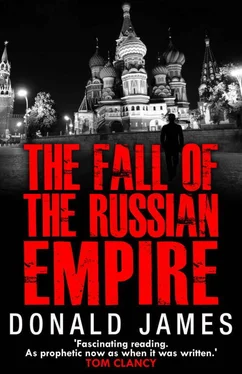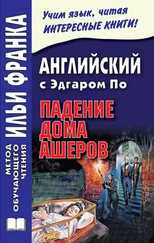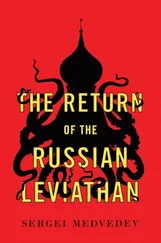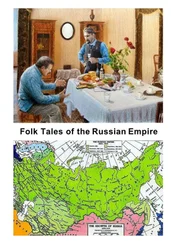Since March it had been even more secure, guarded by a battalion of uniformed KGB troops, its great seventeenth-century refectory building guarded by armed plainclothesmen who sat outside during their long shifts shivering on wooden benches, running unappreciative eyes over its brightly painted checkerboard exterior.
Inside, above the richly decorated refectory hall were the apartments that Natalya Roginova had occupied since her arrest.
During the afternoon of December 20th, when the chanting of the seminarists in the north section of the monastery murmured through a light snowfall, a green-painted military car drove through the Uspensky Gate. At the checkpoint it stopped and General Rossasky climbed from the back. The KGB guard-lieutenant saluted and followed the young general into the guard post, baffled that no explanation for the visit had yet been offered.
Rossasky, in long gray greatcoat but bareheaded, offered the lieutenant a handful of papers to examine.
“You will see from those, Lieutenant, that I have authority from Army Command to remove Natalya Roginova to a safer region.”
The lieutenant had no understanding of the overlapping areas of authority of the Army and Security Forces. But he did know that he would be unwise to agree to anything unless his captain were first informed.
“One moment, Comrade General,” he said lifting the phone and cranking the handle.
Rossasky waited, his lower lip pushed out to caress gently his rich black mustache.
The lieutenant frowned and cranked the handle again. “I can’t hear it ringing,” he said. “Will the Comrade General excuse me while I speak to the guard-commander?”
“No,” Rossasky said. “You stay here.”
Uncertainly the lieutenant stood his ground. “It is my duty, Comrade General, to report all visitors to the monastery.”
The general went to the door and opened it. Three sergeants wearing parachutist insignia on their uniform topcoats entered the post. Each man was armed. Without another glance at the guard-lieutenant Rossasky left the post and got back into his car.
The whole operation was concluded without bloodshed. Within fifteen minutes of the general’s arrival at the Uspensky Gate nearly 200 soldiers were moving through the gardens beyond the Gate Church, fanning out to face the seminary and to occupy the watchtowers along the south wall. Individual security men protested but were silenced by the impressive array of generals and colonels arriving at the Refectory Building. Those who seized an opportunity to telephone for instructions from higher KGB authority discovered that the lines had been severed.
After half an hour Natalya Roginova came through the Refectory from her apartment above. Oil lamps burned in iron brackets round the richly painted room. In the lamplight the deep-hued crimson and blue and gold beloved of Old Russia merged in a warmth of color. The officers around her stopped respectfully.
She turned to face them. “You are aware, Comrades,” she said quietly, “that this is the great refectory of the monastery of Saint Sergei. On this site six hundred years ago a Russian Army was blessed before marching to victory at Kulikove against the Golden Horde.”
She turned again, her eyes slowly traveling round the room. It was as close as she would allow herself to come to a genuflection to Russia’s distant past.
* * *
In his dacha at Zhukova, Semyon Trofimovich Kuba did not respond to the anxieties of Prime Minister Bukin. If suffering were to be inflicted upon the city of Moscow it would serve to justify the harsh measures necessary to face the future. Moscow could burn. If he had learned one lesson from Joseph Stalin it was that Russians were capable of absorbing an infinitude of suffering.
Of much greater concern to Kuba was the timing of the purge of the Army which he realized, since Bukansky’s suicide, was now vitally necessary.
But when Defense Minister Dora arrived with the news of the Army’s release of Natalya Roginova, Semyon Kuba knew that a subtle time schedule for the purge was no longer among his options.
While the two others watched him, he sat down at his desk and drafted a telex to all military, militia and KGB units throughout the Soviet Union:
At a recent conference at Archangelskoye, State Security Minister Kuba and Marshal Kolotkin, in concert, agreed that in these times of international crisis only the closest cooperation between the Soviet Armed Forces and the forces of State Security can liquidate the present threat to the Soviet system. This threat has now revealed itself as an anti-Party movement in sections of the Armed Forces of the Soviet Union. This order, until rescinded, places all Soviet military formations under the direct command of equivalent local KGB and militia commands. Resistance to this order by local military headquarters must be interpreted as evidence to anti-Party activity. Such anti-Soviet elements must be resisted wherever they raise their heads. Only the fullest mobilization of the armed forces of the Bureau of State Security can ensure the defeat of anti-Party elements. All orders which do not come through strict Party and KGB Command channels must be resisted by force if necessary.
The signatories of this order require it to be carried out with the utmost ruthlessness and determination.
Signed: Kuba, Chairman, KGB Kolotkin, Marshal of the Soviet Army
Kuba waved the two men over. “Read that.”
He stood up from the table while they leaned forward to read what he had written. Bukin nodded at each paragraph. Dora read through to the end and straightened.
“Well?”
“It’s a mobilization order for civil war,” Dora said.
Chairman Kuba nodded, then turned to Bukin. “Telex this signal to all State Security Bureau Commands. And all military formations.”
Bukin took the signal and hurried out.
“I want you to move tonight,” Kuba said, turning back to General Dora. “You’ve got your list. I want every senior officer on it arrested at the first possible moment. It’s Katyn forest, Dora,” he said grimly. “It’s our only chance to save the Revolution.”
The door opened and Bukin reentered, his normally flushed face drained white. Behind him six officers came into the room. The leading major general was carrying the signal.
“Semyon Trofimovich,” the major general said. “I am instructed to inform you that at an emergency meeting of the Politburo this evening you were removed from all offices of State. Former Chairman of the Party of the Russian Federated Republic Roginova was restored to all her previous offices in the government and the State. I must also inform you that by the same authority of the Politburo, I am instructed to place you in protective custody. Former Prime Minister Bukin and former Defense Minister Dora are also to be placed in protective custody,” he ended curtly.
From outside in the extensive grounds of the dacha came the thin clatter of automatic fire. The major general consulted his watch. “We will wait until all opposition has been disposed of,” he said.
Semyon Trofimovich Kuba sat down at his desk and took out his pipe. Not looking toward the center of the room, he sucked on the pipestem, one elbow on the desk which Stalin had once used. Try as he might, he could not imagine where he had gone wrong, or how Joseph Vissarionovich might have done better.
During the night of December 20th-21st Moscow waited in darkness. Throughout the city, responding to a call in Iskra signed by Joseph Densky, power workers had failed to come in to the night shift, as had transportation workers and snow-plow operators. The only lights on the streets around the city center were now from the slowly moving patrol vehicles of the militia. A few candles glimmered feebly behind apartment windows but the great wedding-cake skyscrapers and hotels of Moscow disappeared now into the darkness of a starless sky.
Читать дальше












